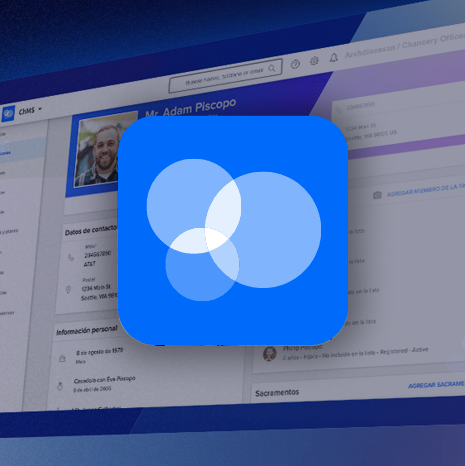How Catholic Leaders Can Make Data-Driven Decisions
Updated December 13, 2023 |
Data-driven decision-making is a hot topic in the business world. However, in the Church world, a priest rarely begins a homily with, “Here’s the data.” That doesn’t mean that data holds no value for the Church—quite the opposite.
Data is knowledge that can help enrich your parish ministry and impact the lives of those you serve. Whether it’s an outward-focused ministry like a soup kitchen or an inward-focused one like faith formation, Bible study, or any internal ministry, you can leverage data to enhance your efforts.
In the Bible, we find instances of data-driven decision-making. Take, for instance, the story of King Solomon (1 Kings 3:16-28). When faced with an unknown situation, he didn’t simply make assumptions based on limited information. Instead, he sought more data to make an informed and correct decision. By taking action based on the data he received, he was able to discern who was truly concerned about the baby.
Similarly, there will be times in ministry when you need help deciding which path to take or what actions to pursue. In those moments, collecting and analyzing data can provide valuable insights and help shape your ministry to better serve your parishioners’ needs.
So, what exactly is data-driven decision-making? It all begins with gathering information, be it quantitative or qualitative.
- Quantitative data involves concrete numbers
- Qualitative data centers around people’s opinions and experiences
Both offer unique perspectives to inform your decision-making process. Perhaps you have ten individuals interested in a Bible study at 5 in the evenings, but only three for a session at 7. Such insights empower you to make choices aligned with the needs and preferences of your community.
Once you have the data, analysis comes into play. It allows you to draw meaningful conclusions and make informed decisions that will yield positive outcomes for your ministry.
In a nutshell, data-driven decision-making holds tremendous potential for priests, pastors, and any parish leader. By embracing the power of data, you can unlock new possibilities, ensure your efforts are impactful, and faithfully serve your parishioners.
As you read through this article, I hope it sparks this question in your mind: How can my data serve my mission? Moreover, how can you better serve your parishioners and fulfill the Great Commission of making disciples?
The Importance of Data In Parish Leadership
I’ve had numerous experiences serving on finance councils and various other roles within the Church. There have been moments when we had to make on-the-spot decisions, and at one point in time, I relied on my intuition.
Now, I pray about the decisions I have to make and seek additional information and data about the situation. For instance, I was once entrusted with training the altar servers in my parish despite my limited experience serving at the altar.
During the first meeting, only about half of them showed up. I assumed that an email in English would suffice to get everyone there. But, I realized that I needed to include translations in different languages. As a result, only one particular group attended the meeting.
At the next meeting, not all the kids were having fun despite my efforts. I had to consider what sort of things would make the altar server training more beneficial to them. What would get them more involved?
Surprisingly, I learned that I made it way too hard on myself. And that by asking them, I was not only able to increase the impact of our ministry for the altar servers but also my ministry in training them. I was also able to make it easier on myself and less expensive for the parish, which meant that they could take that money and use it elsewhere or do something fun later in the year for the altar servers. I had made an intuitive decision at the outset, which wasn’t the best decision.
By collecting data throughout the experience, I could take an ‘okay’ experience and then scale outreach to people interested in that ministry and increase effectiveness among the members in the group. This leads to more efficient ministry while reducing the risks of new ministry. If I had taken the necessary steps beforehand to gather data, I could have made it more successful from the start, while minimizing the chances of an ineffective ministry.
This approach allows you to increase impact, be more aware of future needs, and better serve your parishioners and ministries.
Types of Data That Matter to Catholic Leaders
As a Catholic priest or any parish leader, it’s crucial to focus on the metrics and factors that enhance each ministry’s growth. Within most parishes, each ministry is unique and multifaceted, so the considerations for one may differ from another.
You can start by examining the sacraments received by different age groups and identifying those who haven’t received them.
Additionally, it may be helpful to know who consistently contributes to your parish and who hasn’t in recent years. This information can guide your outreach efforts tailored to each individual’s needs. And tracking attendance at specific parish events, Bible studies, or other ministries can provide valuable insights.
Consider sending out a survey through ParishStaq, where you can ask parishioners for more input, like the right timing for Bible study classes. If someone expressed interest but never attended, it might be because the timing didn’t align with their schedule. Once you have this data, you can adjust schedules to accommodate more parishioners.
Combining the data you collect with a church management system like Pushpay allows for a comprehensive overview. You can gain valuable information, make informed decisions based on this combined knowledge, and steer your ministry in the right direction.
Tour our Parish
ChMS Product
The only cloud-based solution for parishes in English and Spanish.

Tools for Gathering Data
In Proverbs 2:6, it says, “The Lord gives wisdom; from his mouth comes knowledge and understanding.” As parish leaders, we strive to acquire knowledge. But how do we reach a deeper understanding?
There’s an array of tools at your disposal. Some of you may have attendance sheets, carefully maintained by the ushers at the back. Others rely on catechism, teachers, or faith formation materials. Parishes are blessed with a wealth of information and data. The tools you use to collect this data can be as simple as pen and paper or advanced as Excel spreadsheets. Or powerful like Pushpay’s church management software.
All of these tools are valuable. However, by using the right tool for the right job, you can accomplish your tasks more effectively. For example, I could chop a tree with an ax. While an ax can do the job, a chainsaw makes the work faster. Similarly, selecting the best tool for the task at hand will enable your parish to carry out your duties more efficiently and effectively.
By utilizing the best and most appropriate tools for your needs, you’ll enhance your ability to efficiently gather data. Then, you’ll be able to make more informed decisions, ultimately saving valuable time. No more wasting precious moments searching for that one piece of paper from months ago. Instead you can collect status updates in your church management software, manage events, and draw from its wealth of information, helping inform future decisions.
While church management software might not always be the obvious choice, it plays a crucial role in collecting, storing, and organizing data to facilitate your ministry and connect it to individuals.
Pushpay also provides the LEAD App, which puts the power of Pushpay’s church management software right in the palm of your hand. Imagine being a priest, called to a hospital due to someone’s critical condition, and having access to information right away. Your priest would be able to gather insights and make important decisions about his ministry with the family on his way to the hospital.
For development directors and parish administrators, their primary ministry is to support the various ministries by raising funds. Luckily, you already have many of the tools at your disposal to analyze and understand the giving information of your parishioners.
Within this data, you’ll find different segments that provide valuable insights. By pulling reports, you can identify those who haven’t been contributing and those who used to give but have seemingly stopped. In the latter case, it might be worth checking on these individuals. A simple touchpoint could make a huge difference.
For the other group, some individuals may give regularly but occasionally miss a week or two. This presents a fantastic opportunity to engage with them personally. Perhaps they’re struggling to find the time to set up recurring payments. Or if they faithfully donate every week but occasionally forget their checkbooks, it’s worth discussing the benefits of switching to digital recurring giving. On average, recurring giving brings in more money per donor, which can significantly impact your parish.
These various data points and insights will help inform and empower your ministry to generate support, not just in terms of finances but also in time, talent, and treasure.
Understanding how to collect and store data plays a crucial role in determining its usefulness. We wholeheartedly value the significance of data privacy and follow best practices in this regard. Our robust system is specifically designed to safeguard your information from any external threats, and we adhere to high standards and cybersecurity practices with our five-step process.
When searching for an online giving platform and church management software, we believe you deserve complete peace of mind.
Take Action
As disciples of Christ, our mission as the Church is to make disciples, baptize, and teach. So we need to ask ourselves, ‘What can the data that we have do to serve our ministry?’
After reading this article, I encourage you to consider these key points and the potential of data in helping to meet the future needs of your parish community:
- Strategize and identify key areas within each ministry
- Determine what relevant data to collect
- Use that data to inform your ministry
Lastly, I want you to take action on that. See how data-driven decision-making can help inform, improve, and increase your impact within your parish community.
Want a peek into the tools mentioned above—ParishStaq, LEAD App, Church Management Software, and Giving? I invite you to take a free self-guided tour of each of our products and discover the impact we can make together.
Featured Content
You May Also Like
